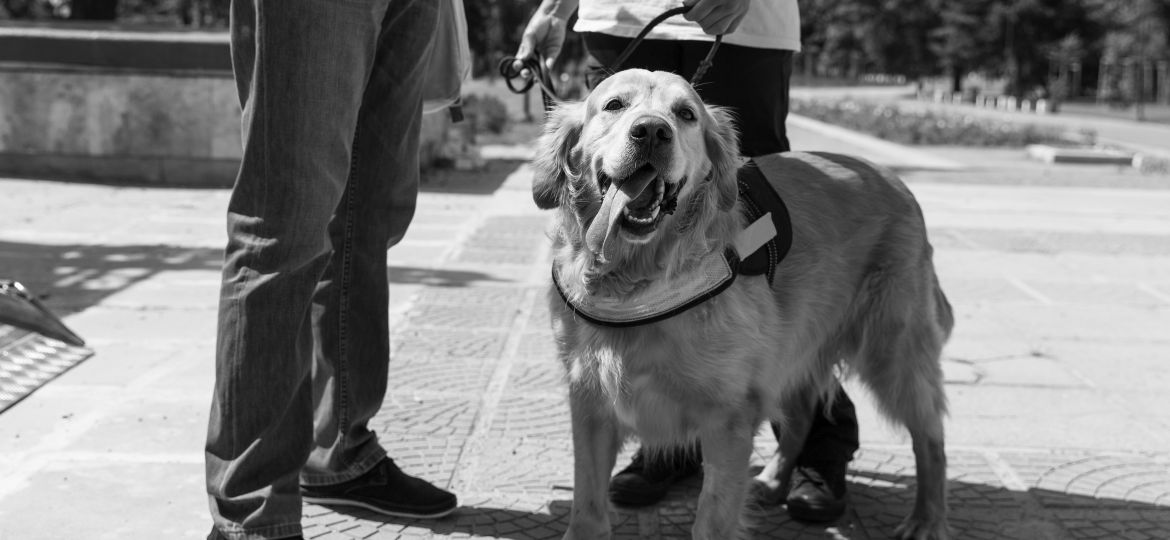If you’ve ever spoken to someone with a service dog, it’s easy to see that these animals change lives. For a veteran returning home with post-traumatic stress disorder, the canine “battle buddy” is there to shine a light on his or her darkest hours. For a child with epilepsy, the family can rest easy, knowing that there is always someone there to lend a helping paw. If you are living with Parkinson’s, a service dog could be a transformative feature in your story.
How a Service Dog Could Make Your Life Easier
Service dogs are specifically trained to perform tasks to assist individuals living with physical challenges, including people with Parkinson’s. Service dogs help to improve their human companion’s independence and well-being, and studies show that the dogs provide a variety of benefits, including:
Encouraging Regular Exercise.
Research continues to highlight the benefits of regular physical exercise for people with Parkinson’s. Service dogs can both encourage and enable more regular exercise.
Reducing Loneliness.
Service dogs provide more than help; they provide companionship. The mere presence of a service dog can increase social interaction, as people come up to meet the dog and its guardian.
Daily Help.
For people with Parkinson’s, service dogs can be trained to perform a variety of helpful tasks, ranging from daily assistance with routine activities to specialized support. Service dogs can help with:
- Enhancing your balance while walking or using stairs, reducing fear and risk of falls
- Mitigating freezing by nudging a leg or gently pulling on a leash
- Providing support while getting in and out of chairs or getting up after a fall
- Retrieving and carrying objects, such as medication bottles or a dropped phone
- Assisting in dressing and undressing by fetching clothes or gently tugging off socks
- Opening doors and turning lights on or off
- Retrieving adaptive equipment or pulling a wheelchair
- Seeking help, pushing Lifeline call button or dialing 911 speed dial
Parkinson’s New Zealand interviewed two American women with Parkinson’s to learn how they interact with and rely on their service dogs’ support daily. Watch the short video to see how these furry companions can improve mobility, restore confidence and foster greater independence.
Things to Keep in Mind When Considering a Service Dog
If you’re interested in getting a service dog to help with Parkinson’s, there are a number of important things to consider.
Cost
Some organizations require significant fundraising or payment for service dogs. Others only charge a small application fee. Regardless, you should think about budgeting for the cost of your future dog, since in the US, no state, federal or private health insurance company will cover their living expenses.
From food, to regular veterinary check-ups and vaccines, you should estimate about $2,000 per year to care for your dog. While this is a great place to start, it’s important to remember that unexpected veterinary expenses can happen. Think in advance about how you would respond to these circumstances, and clearly establish whether there is a limit to the amount you could spend on veterinary care.
Time
As the value of service dogs becomes more widely recognized, demand continues to increase. When exploring different service dog provider organizations, ask what the timeline looks like for receiving your dog and whether they have a waitlist.
Talk to Your Doctor
As you consider whether a service dog might be a good fit for you and your family, be sure to ask your doctor to help you assess how you may benefit. Together, you can talk through your symptoms, needs and limitations. You can also let your doctor know what role they he or she will play in your application for a service dog, be it providing a copy of your medical history or completing any additional paperwork.
Breed Requests
While some organizations specialize in one breed of dog, many will allow your input on breed or size. For instance, if you need help with brace and balance tasks, you’ll need a dog large enough to support your weight.
Additionally, you may request a hypoallergenic breed if you or a family member suffers from allergies. Special requests could impact your wait time, so be sure to mention this up front for a more accurate estimate of when you could expect to receive your dog.
Current Pets
Having pets does not disqualify you from being considered for a service dog. The right organization will work with you to ensure your service dog gets along with any other animals already living in your home.
Application Process
The application process exists to ensure that you are a good fit for a service dog and that the best match is made for your particular needs. Applications vary by organization and can be lengthy. Some common topics covered can include:
- Describing your Parkinson’s and the type of assistance you desire
- A background check and/or information about pets you have owned previously
- Video or photography may be used to further document your mobility and your home/work environment
- Letters of recommendation and/or a medical history can provide additional support for why you would be a good candidate for a service dog
- For non-active military, a copy of your DD214 form (Certificate of Release or Discharge from Active Duty) may be required
Occasionally, organizations require an in-person or phone interview to discuss your application in more detail.
Training and Follow-Up
In the end, you and your service dog will be a team. You’ll need to know how to work with your dog and what to do if you have problems.
Ask about the organization’s “placement process” and how you will transition into caring for and working with your new service dog. In addition, ask whom you can contact if you run into problems or need to add new skills to your dog’s knowledge base.
Laws and Etiquette
The scope of service dog etiquette and laws continues to grow, so ask how the organization providing your service dog will prepare you to answer questions and advocate for your rights to public access and accommodations.
Check Out Organizations in Your Area
Assistance Dogs International (ADI) is a coalition of nonprofit assistance dog organizations that meet the highest level of standards in training, care, education and advocacy for assistance dogs. The ‘Programs Search’ feature helps you to locate organizations nearest to you. Take advantage of the opportunity to reach out and learn more about this exciting option on your journey to living well with Parkinson’s.
If you or someone you know has a service dog for Parkinson’s, what advice would you or they give to others considering a service dog?
If you’d like to be part of early research efforts that are looking into the efficacy of service dogs for those living with Parkinson’s, please take this survey.


















I have been living with Parkinson’s (officially) since 2012 (unofficially several years earlier) and find that Tai-chi classes are great exercise. The classes and exercises have helped to improve my balance and flexibility. I believe that I am able to recover my balance quickly to prevent a fall. I feel more positive about my life when I have finished a class. My teacher’s philosophy is “Don’t fall down” Don’t get hurt” and tai chi helps me achieve this goal.
Thanks for sharing, Chipper!
I’ve been waiting for ‘my’ Service Dog since May of 2015 and only recently saw it. She is a brown and white standard poodle and she’ll be finished training in June. If you THINK you want one, apply now. I began looking in 2013 immediately after seeing Carolyn/Selma Renee/SirThomas at WPC.
Great advice, Linda! Thanks for sharing. We’ll be eager to hear more about your experience once you receive your dog!
I have Marko my yellow lab. Marko helps me with all of the above things. He also opens doors and closes them. He pushes the button to open the handicapped doors and calls the elevator.
Marko helps with my freezing and balance. Pulls my socks off and gets my shoes for me. Picks up things that I drop like my keys or my cane. He was with me at the PAN forum and went through the halls of congress with me.
Thanks for sharing, Michael! It’s wonderful to hear all the ways Marko helps you live well.
in Florida there is New Horizons that is a charity organization. Also there is Classic Service Dog Network. There is a cost with them but is reasonable compaired to other places that train dogs.
Michael, thank you for sharing your advice!
Hi Michael. I called (one place so far) to try to get my husband (PD) a therapy/companion dog but they told me that my husband would need to exercise the dog. I found this confusing, what if he was in a wheelchair? He’s not yet, but he certainly can’t get out to walk up and down the street with his dog 🙁 Any suggestions?
Emily is my Golden Retriever who helps me walk 2 miles a day, prior to her arrival I had to wait for family to assist me in case of a fall.
Thankfully DBS has helped with freezing, but I still need my friend to help with balance.
Teamwork I & Teamwork II a Dog Training Manual for people with Disabilities by Nordensson & Kelley are recommended.
Thank you for sharing, Tom. We love hearing stories about how Emily helps you live well.
I am the lucky partner to a 6 year old yellow Lab assistance dog, Ely. He and I have been a working team for 4 years. In addition to all the regular assistance dogs tasks he knows, he improved the length of my stride so I no longer take those little Parkinson’s shuffle steps. Prior to getting Ely, I raised 10 assistance dog puppies. These dogs are life changers!
Thank you for sharing, Bonnie! It is wonderful to hear about how Ely has made an improvement in your life.
I have a great girl canine for my partner, I obtained her from Canine Partners for Life in 2012. I used a walker until I obtained Tia during team training, at that time I placed my walker in the office area, and picked it up the day I returned home more than 3 weeks later. Tia became my walker dog, and I no longer needed my walker. Tia was of extra help to me during a summer when I had both of my hands operated on. She was able to open my drawers, doors, cabinets, and did more carrying for me. She is able to do all the tasks that most people with disabilities need done for them, but my main issue is balance. Since I have been with Tia, I have had improved brain function, have been able to meet the people in my neighborhood (with my walker I was not able to get out into my neighborhood) We enjoy long walks in nature, and have traveled by train, plane, bus, rapid transit, and a number of trips by car. She is a great traveler no matter the mode of travel we are using. I love Tia and she loves me, and everyone that sees us together will attest to that. We went to Yellowstone National Park and she was great the entire trip. The animals were no issue with her, even though I got very close to them. I walked all about Washington DC, and seen all the monuments with Tia and my sister, Tia just trotted right along the whole time in the rain at that. She is a great partner in every way possible, as well as a great traveler. I am blessed to have my great girl, who happens to have been a rescue canine, donated to Canine Partners for Life, that is a mix of Blue Tick Coonhound, Dachshund, Field Lab, Bassett, and Red Bone, as reported on her DNA test done by my vet. She also gave me the ability to go and visit Independence Hall, and the Liberty Bell making the trip to Philadelphia PA by ourselves from Canonsburg, Pa which is all the way on the opposite side of the state. We are a happy and joyful pair of travelers. Written by Tia’s mom, Judy
Judy, thank you for sharing this with us! We love hearing stories like yours and the positive impact Tia has made in your life.
I know Judy from when she first was partnered with Tia. Great to hear how well they are doing together.
I am considering a service dog to assist with my PD symptoms. But I currently have a small dog that has been certified as a therapy dog with PAWS for People (we visit schools, libraries, nursing homes, etc.). We keep pretty busy and it is tremendously rewarding, but it can be difficult at times due to my PD.
I am unsure about whether I have the physical ability to care for two dogs at this time though I know how much service dogs can truly help improve the lives of people with PD.
It’s wonderful to hear you find your work with PAWS for People so rewarding. You bring up an excellent point about considering a service dog, the ability to care for the dog. It is not fair to any animal to bring them into an environment where you or someone living with you cannot provide consistent and quality care (both physically and financially). If one dog is your physical limit, you can consider training your current pet to assist with tasks you find challenging.
My husband has PD. Diagnosed in 2012. We have a dog, poodle/maltese, a rescue, tho he’ s hardly a Service Dog. Just a companion….very very friendly. We take him to the PD meetings where he is welcomed. No one here has said how much a service dogs costs, even ball park range. I’d like to know.
Lovely to hear your dog joins you at your Parkinson’s meetings! You’re right, we touched very briefly on the estimated cost for a service dog so let me explain why this range can be difficult to pin down. It can cost a service dog organization between $30,000-35,000 to care for and train a service dog. This amount covers everything from medical care, nutrition, training treats and equipment, room and board, staff time for training, and more. That being said, organizations have different methods for offsetting this cost. A lot of organizations make it their mission to provide service dogs free of charge and are able to do so with the generous support of individual donors. As mentioned, small application fees (usually between $30-$150) may be required for these organizations. Others may require you to pay (or fundraise) for your service dog in full or in part. Scholarships or trained staff members may be available to assist with your fundraising efforts. That’s why if you are considering a service dog organization, my best advice is simply to ask about the cost! Hope this answers your question, Mary Ann!
I’ve been desperately trying to get a service dog for a long time. I sent applications, called, and searched all over the web. Yes, even Assistant Dogs International. I live in Northwest Arkansas and the closest program is in St. Louis, MO, but they don’t have mobility service dogs. And everyone else is too far for me to go. I did find one training facility in Arkansas and you have to provide the dog & pay $15,000!!! For training!!?? Who has that kind of money??!! I want to get out more and walk/exercise. When I’m home by myself my wife worries about falls and being alone.
Service dogs are great for people with Parkinson’s…if you can get one or have the money.
Hi Chris, thanks for your comment. It’s great to hear you’ve looked at the Assistance Dogs International site and started on applications. As we mentioned in our blog, some organizations do require a big payment or significant fundraising for a service dog. There are others that only charge a small application fee (though their waitlists are long, so we’re glad you’ve already started submissions). We would encourage you to keep looking! It never hurts to call somewhere new or check back, many of these organizations will be open to working with you on travel arrangements to meet your needs. If you are working with an organization out of state, many will only require you come in for an initial ‘match’ meeting and the final segment of ‘placement’ training. Best of luck in your search.
My husband is 83 with PD. He has freezing and tremors and other PD symptoms. I am his ‘service animal’ so far. He fell and broke his arm and some ribs, then got pneumonia and then when the arm was slow in healing was discovered to have osteoporosis. He should be coming home soon from the rehab center. Is he too old for a service dog? I don’t see him walking a dog daily. I am very concerned about him falling again.
I have had a Parkinsons Sd for 14 yrs. We are one of the first in the USA. My life with these highly trained and loyal dogs are a joy and life line to folks with PD. I have spoken to many and written about have a PD SD esp at the young age of PD. I also warn folks to never fake a SD and to be serious about have on. My first pup 11 yr s old Maggie a black lab border collie she is now retired last yr. She living life of retirement and is a therapy dog for folks in nursing with PD. My new dog is Maia a beautiful 5yr old German Shepherd fully AKC and highly trained esp for my PD needs. She is a love and so so smart. Pls contact me with questions. Also know I am Not a trainer and my dogs are.paid for via grants and privately Sd training for my PD needs. Also note a pd therapy dog are wonderful also but are not in USA the same as a medical SD. ADA and Federal laws protect Parkinsons medical service dogs. Thank you. Marcia and Maia dog. .
Where can you train your own dog to be a service dog for your own family member?
On Assistance Dogs International’s website, the Accredited Members Search tool can be used to identify programs in your area. Under “Other Information” a program can list if they will consider the use of a person’s own dog. If there are no organizations in your area that will consider this, you can always call an organization to see if any of their trainers take on private training or have recommendations for trainers that do.
I am 54 and have been dx for 3 years probably have had pd 6 years. I have mobility issues, balance issues and severe dystopia (seizures) at night. My wife purchased a Lab male pup, his name is Boudreaux. He is 5 months old and can already sit, stay. Stay at a distance, and retrieve my shoes from another room and alert my wife if I have a fall. He will not let me out of his sight. Myself, wife work with him every day and a alc certified trainer twice a week. He has truly been a God send for me. He wears in training badges and do not pet. Local stores including Walmart encourage us to come in shop and been seen. OH and he is close 50#’s so he is a big boy and tall. I would advise anyone considering a SD please make the effort and put in the time it will change you life.
We’re so glad to hear that you’ve had such a positive experience training Boudreaux! Thanks for sharing your story, Ed!
Hi, I was wondering, could a service dog actually be dangerous for someone with Parkinsons? For instance getting in the way and tripping them up?
Thanks~
Hi Meg,
Well-trained service dogs are trained not to do that. I definitely think you could run into that situation if you trained the dog yourself; however, people who are experts at training service dogs for people with Parkinson’s and other conditions would not certify a dog as trained if the dog could potentially trip up their person. Not that accidents never happen, but it is very unlikely with a professionally trained service animal.
Hi Melani, I’m sorry, i don’t think i saw your response. thank you. i just posted another question in reply to michael.
My wife has Parkinson’s and doctors say she would benefit from a service dog. But we are not rich and live month to month. Is there an organization that would help with getting her a service animal. I am desperate for all or any information. Thank You
Hi Allen,
Thanks for reading. I have not had any specific experience with these organizations; however, I know there are several non-profit service animal organizations around the country. I would start with a Google search for those and see what you can find. I know there are a lot of people in a similar boat and a lot of organizations committed to getting people the help they need. It just may take some time to find the right one for you.
I don’t mean to discourage anyone, but I did 6 years worth of research, writing, and calling various organizations about getting help to get a Service Dog and it all lead to zilch! So I found a great breeder who has bloodlines known for producing several great Service Dogs and will be getting a puppy from her soon that I will train myself (with some help). If you can, it’ll probably be your best option.
I’m looking for a service dog for my mom who has Parkinson’s. We live in Atlanta. Does anyone know of an agency that provides mobility assistance service dogs to people in our area? (I’ve found agencies who train mobility assistance dogs but she doesn’t qualify either because of non veteran status or area of the country). I think it would be very beneficial to my sweet mom. Thank you!
Hi Beth – Thanks for reading. I reached out to our Ambassador (Kimerly) who lives in Georgia and here’s what she had to say about it.
There are several places that complete ADA Service Animal Training, and yes some can be quite confusing on who they accept. But below is a fantastic link to our state approved site that lists out several orgs to choose from that provide services from providing the dog to providing the training needed to be legally certified in Georgia. Service Animals | State of Georgia ADA Coordinator’s Office
Hopefully, this will get you started.
What a great article! I agree that it would be wise to condition dogs
Because I can’t afford a program trained dog, I’m getting a puppy to train myself. I have experience training Collies including helping my Grandfather train my Grandmother’s mobility dog. I also have 6 books on training Service Dogs, but I’d like to know if there’s a book or DVD specifically on training dogs for Parkinson? Thanks.
Hi Jazherah – Unfortunately, I do not know about any books that speak specifically to training Parkinson’s service dogs.
I had the best service dog that I raised and trained myself.
“Bear” was a Black lab border collie mix. He helped me get moving when frozen, fetched things by name or dropped items
We spent so much time together in the 4 years I had him that he could actually sence when it was time for me to take my meds and kept me on track.
He was a great listener during the rough nights alone, and Loved to wake me up in the morning to start a fun day of bike riding-with him running beside me. Always made me nervous so I built him a trailer to ride in safely behind me. We were inseparable he was my best friend
But unfortunately my roommate took him to The store one night and left him in the car too long
He wanted to be with me so he jumped out of the cars sunroof and tried to run home…..he didn’t make it. I found him an hour later on the side of the road covered with a t-shirt
I haven’t been the same since. He got his last ride in the trailer the next morning when I took him to be creamated.
He’s in a box on my headboard now
I miss him daily and my struggle sucks without him
I’m hoping to get a Great Dane for my next support dog although they don’t live long enough
Dear Lyon,
I am so sorry to hear about your dog. It sounds like you had a very special relationship, and he helped you in so many ways. Dogs are amazing creatures. I have two of my own who are my constant companions, and we have an office dog named Banjo who makes all of us happy. I hope you are able to get a new dog and best friend soon.
Im interested making my shitzu a service dog for companionship for my mother n law she has parkinsons she loves being around my dog hes a lap dog and loves the attention she wants to be around him all the time. I was wondering if there was a fee and how do I go about getting him registered. If you could please let me know. thank you Stephanie Jordan
Hi Stephanie – Thanks for reading. There’s a difference between a service dog and an emotional support animal and therefore different paths on getting them registered. This article has more information on that: https://www.davisphinneyfoundation.org/blog/life-dempsey-parkinsons-service-dog/.
Hi, I am inquiring about training my dog as a service dog. She is 2 and a half year old happy bully. Is there any fees involved? I jus got diagnosed with Parkinson’s stage 2 going into stage 3 and I dont know how progressive it is, due back with my neurologist in 5 months to retest to get more answers, goping for good news. Thanks!
Hi Veronica,
Thank you for reading and reaching out. Service dogs for people with Parkinson’s can be so wonderful. They do take a lot of training and, if you want to get one that has already been trained, there is definitely a fee involved. Because local resources on your next best step are probably best, my recommendation is to reach out to your local humane society or Google Parkinson’s service dog trainers and start from there. They might be able to point you in the right direction for your specific situation. Best of luck.